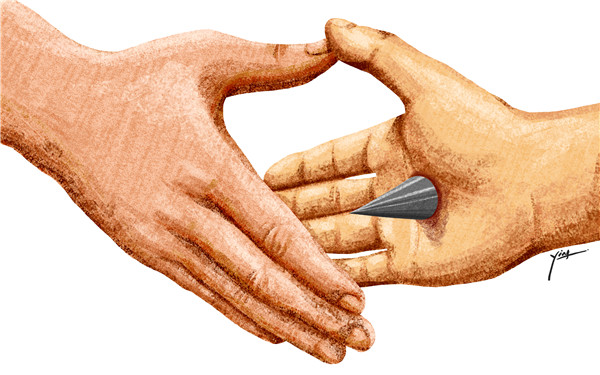
On the morning of Sept 8, a student in Anhui province was bicycling outside her college campus when she spotted an old lady down on the ground, screaming. She stopped to help.
The "granny", as women in their senior years are often addressed in Chinese society, accused her to knocking her down in the first place.
Yuan Dachen, the college junior, resorted to the Internet for witnesses. Despite omnipresent security cameras, that particular place where Gui Qingying, the old lady, fell happened to be a blind spot.
Two witnesses, students from nearby schools, have since turned up, testifying that Yuan was not the reason Gui collapsed. Police are still investigating, saying it is too early to draw conclusions.
Online denizens, however, are overwhelming in their support for Yuan, convinced that Gui framed her.
The reason the Chinese public automatically takes the side of the youngster is the prevalence of old people pretending to be injured in public places and using that for extortion.
It has developed to such an extent a special term has been coined. "Touching porcelain" (peng ci) was originally used for people who carry a fragile object, such as a porcelain vase, across the street and pretend to be hit by a vehicle.
To avoid legal complications, the driver usually opts to settle by giving a couple of thousand yuan. (Chinese are in the habit of carrying cash in their pockets.) Now, it is reported, some use their body for the same purpose.
Of course, each case can be different. In some instances, the helpers eventually admit to being culpable in the first place and provide assistance out of guilt.
Overall, every time a good Samaritan becomes the target for extortion, a chill sweeps through the whole of Chinese society, sending out the alarm that you may be penalized for an act of altruism by the one you want to assist.
The result: People stay away in droves whenever a person, especially an old person who falters, seeks aid in a public space.
Sometimes, those who come to the rescue whip out their mobile phones and record the scene as evidence or find witnesses before approaching the victim.
It is ironic and sad that a society that prides itself on respecting the elderly has come to this.
But caught between a citizen's duty to give a helping hand and the chances of being blackmailed, one naturally skews toward self-protection.
There has been a prolonged debate on the causes for the eroding trust in our society. Many employ the East-West comparison, citing personal experiences in, say, the United States where they are helped by strangers.
I have been the benefactor of such kindness while I was living there, so I admit that, on average, trust in American society is more taken for granted than in my home country.
While I agree with most of the analyses, I feel the fundamental cause is not race, ethnicity, or class, but rather, changes.
Sure, thefts and other forms of dishonesty exist everywhere, but if you visit the poorest inland villages, you'd still find people taking in a wayward traveler without a trace of suspicion and sharing their only food with him.
Anxiety arises when they see some of their fellow villagers accumulate wealth, sometimes through shady practices. As the psychological balance is lost, the original value system that binds the village together is threatened.
The same is true of the middle class. My first visit to Taiwan awakened me to the traditional Chinese way of treating each other. What's described in old books came vividly to life in front of my eyes-people readily giving trust to strangers.
I could not distinguish the local banknotes and mistakenly gave Hong Kong dollars to a street vendor, and he pointed out I had paid many times the amount I owed. This was in a touristy venue where I, with my mainland accent, would not likely return if I found out the error.
I'm not saying this would not happen in a mainland tourist destination, but the probability is generally less.
Chinese society has been going through such vast changes that many people are between social classes, so to speak, as if one has jumped from one side of the balance beam to another and is still wavering.
One in this state is more tempted to take shortcuts, ethical or otherwise. Because you have not settled into a new social stratum, you are prone to misjudgment and miscalculations. One incident of credulity could lead to your assets being wiped out lock, stock and barrel.
Another factor is a change in locality. A place with a high percentage of newcomers tends to have low degrees of trust and a high crime rate.
In the 1990s, some Chinese cities were plagued by random muggings on the street; people were advised to watch out and to see every one who crossed their path as a potential mugger.
In that environment, trust was a luxury few could afford.
With the expansion of the middle class, Chinese society is achieving renewed equilibrium. One is more likely to reach out and help someone in distress, someone you do not know, that is.
However, this is marred by such acts of taking kindness hostage as the "I'm falling and I'll squeeze you dry" story.
Another example: Giving money to a child beggar will not only fail to help him, but end up funding the crime ring that exploits this child and more hapless children.
When archetypal victims such as the old and the underage are used as baits for exploiting human compassion, it tears apart the social fabric that gives us cohesion-a cohesion that takes many decades and hundreds of millions of people to build, with countless small gestures of trust.





